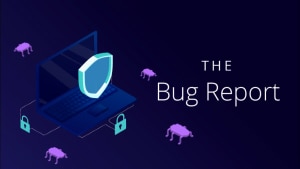The Bug Report – October Edition
Apache server version 2.4.50 (CVE-2021-42013)

Your Cyber Security Comic Relief

Apache: CVE-2021-41773 and CVE-2021-42013
What is it?
2 CVES / 1 Vuln – It appears Apache struggled a bit with this latest critical vulnerability, where it took two tries to fix a basic path traversal bug, which was introduced while patching last month’s SSRF mod_proxy vulnerability. As path traversal bugs do, this allows unauthorized users to access files outside the expected document root on the web server. But wait, there’s more! This can lead to remote code execution provided mod-cgi is enabled on the server.
Why am I here?
Regardless of the origins, you’ve arrived at Advanced Threat Research team’s monthly bug digest – an overview of what we believe to be the most noteworthy vulnerabilities over the last month. We don’t rely on a single scoring system like CVSS to determine what you need to know about; this is all about qualitative and experience-based analysis, relying on over 100 years of combined industry experience within our team. We look at characteristics such as wormability, ubiquity of the target, likelihood of exploitation and impact. If you don’t agree with these picks, we encourage you to write a strongly worded letter to your local senator. In lieu of that, we present our top CVEs from the last month.
What can I do?
Oh! I know, use Microsoft IIS! If you’re not ready to completely abandon your webserver implementation, I suggest updating to Apache 2.4.51. Remember to avoid version 2.4.50 as it does not patch both vulnerabilities. If you have been an astute system admin and followed the Apache documentation using the default and pretty darn secure “require all denied” directive for all files outside the document root, kudos to you! Although patching is still highly recommended, you are not immediately vulnerable.
Who cares?
A quick Shodan scan told me there are at least 111,000 server admins that should care! With Apache being the second largest market share holder of implemented webservers, there is a good chance your organization is using it somewhere. It’s always important to consider both internal and external facing assets when looking at your exposure. Apache is even commonly used as an embedded webserver to other applications and should be reviewed for use in any installed 3rd party applications. Oh yeah – and if you overlook an instance you have installed somewhere, this IS currently being actively exploited in the wild – no pressure.
Win32k Driver: CVE-2021-40449
What is it?
Ain’t nothin’ free anymore! Except kernel module addresses on your Windows machines, thanks to Microsoft Windows CVE-2021-40449. This vulnerability is a use-after-free in the NtGdiResetDC function of the Win32k driver and can lead to attackers being able to locally elevate their privileges.
The Gold Standard
We recognize in some special cases patching is harder than compiling gcc from source, so McAfee Enterprise has you covered; we have been detecting path traversal attacks in our Network Security Platform (NSP) like it was going out of style since 1990 (and it was).
What can I do?
That boring Microsoft patch Tuesday thing still works, or you could just use a superior operating system like FreeBSD.
Who cares?
Are you currently reading this from a Microsoft Windows machine? Using Microsoft Server edition in your cloud? Local attacks are often given lower priority or downplayed. However, it is important to recognize that phishing attacks are still highly successfully as an initial point of entry, facilitating a need for privilege escalation bugs to obtain higher level access. So, unless you are a hardcore Linux and Mac-only shop, you may want to patch since this is actively being exploited by cybercriminals, according to our friends at Kaspersky.
Apple iOS: CVE-2021-30883
What is it?
An integer overflow vulnerability in the iOS “IOMobileFrameBuffer” component can allow an application to execute arbitrary code with kernel privileges. This has additionally been confirmed to be accessible from the browser.
The Gold Standard
Have you checked out the latest version of McAfee Enterprise ENS lately? Detecting exploitation and cybercriminal activity is sort of its thing, assuming you have grabbed the latest signatures.
What can I do?
You should be sensing a common theme in this section – and, in this case, you actually can take action! Stop reading this, plug that mobile device into a power source, and install the latest version of Apple iOS.
Who cares?
Since Apple still reportedly holds 53% market share of all smartphone users, statistically speaking your organization should care too. It only takes one bad apple to hack your entire network, and with reported active exploitation in the wild it might happen sooner than you think.
The post The Bug Report – October Edition appeared first on McAfee Blogs.
The Gold Standard
Since you stopped reading and updated already, congrats!
This post was first first published on McAfee Enterprise – McAfee Blogs’s website by Douglas McKee. You can view it by clicking here

